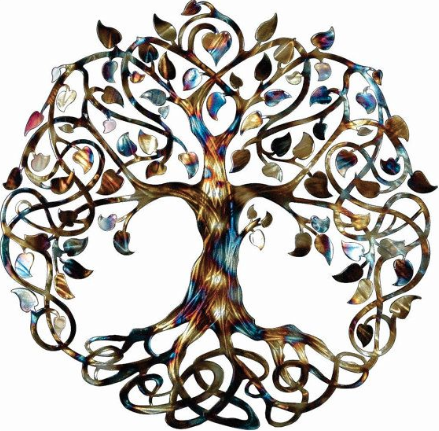
Even though you can’t see them, they’re there—your ancestors. At least some of mine are on my wall. I’m lucky to have their photos, and as far as the eye can see, they are orthodox Jews from Romania, Belarus, Siberia, and Austro-Hungary. But what about beyond? Many people were never told the names of their great grandparents, have never seen pictures, or were adopted, or their families all perished in a migration, war, or famine, along with any records that they existed. What then?
In other cases, I’ve heard people say that they don’t feel a connection to their ancestors, that they were Nazi’s, or Cossacks, or members of other dictators’ armies, and that they did terrible things to many people. To the contrary, I’ve also heard teachings that if you are staunchly opposed to what your ancestors did, you don’t need to love them or connect with them, that a larger umbrella of all the Ancestors are also our ancestors.
I got curious about ancestors a while back when I realized a bunch of my family members had sexually abused other family members. Not only was it shocking because of the hurt caused to this and other generations, but because I guessed that it was systemic in my family tree.
I know I’m not alone with this revelation. Intergenerational trauma is kind of how it works. One generation is treated badly, which can lead to re-enactments in their kids, and in those kids’ kids, and so on. It only takes one member of the family to stop it, mind you, and as far as where it first started? Well, that’s another conversation.
The importance of all this goes something like this: When our oldest die, ideally they have lived their lives with enough integrity, that when it comes time for them to assume their new place, as ancestors. they can offer us a kind of sustenance that we cannot offer ourselves. It is said that our ancestors guide our deepest urges and dreams, and supply us with the unique know-how that let’s us carry them out. For example a child who grows up to be a concert pianist would likely have ancestors who had musical talent, and that the emergence of a great gift is cultivated sometimes over many generations. People who are wise to these things have also said that we receive light from our ancestors.
This all could sound pretty far out. After all, how would any of this actually work?
I’ve collected stories and experiences over the years to help me answer that question, the latest of which is this one: I recently attended a week-long silent meditation retreat. Fifty of us meditated either by walking, sitting, or eating in total silence, with occasional guidance from two experienced female teachers. Throughout the time, I would often get to thinking about something, and despite the guidance not to spend too much time following our thoughts, there was also room to investigate if it seemed relevant to the practice.
One afternoon a tree entered my mind’s eye. The tree was tall, strong, and alive. Near its base though, close to where I sat, its insides began to look dark, rotten, and almost blotted out by a a black cloud. I knew my intuition had presented me with an image of my family tree. The dark patch was familiar. I recognized it as the evil behaviour enacted by certain individuals who had come before me. No amount of healing, inquiry, or ritual I had done had made a lasting effect on this dark presence there, and sadly, I often imagined myself unable to belong to this tree, and instead often imagined that I sit somewhere just outside of it.
I looked up at the tree, allowing myself to wonder what things were like up above the darkness. Things seemed healthy. There was strength and light. I could even imagine the vague faces of my ancestors, clothed in traditional garb, shining, and well. But down here, closer to me, it was though I could not receive any of that light. I could only feel the interruption and burden of my more recent elders and ancestors. Accustomed to, but now tired of this futility, I asked my intuition to give me a new question, or a new way to approach this dilemma. I knew this dark feeling in my life and was starting to that question things had to stay this way.
The response I got was, how does a tree deal with disease? Good question! If a tree can endure hard times and can go on living, then it must have some intelligent way to contend with incompatible moments in its internal ecosystem. It occurred to me that if a tree knows what to do, then I might ask the tree to sort this gnarly mess out for us!
Before I could even complete the thought, I saw the tree take the dark mass in its centre and switch it to the outside of its trunk, like a bump or tumour. It then took me and brought me in where the darkness had been! Light poured down into me, I saw the old ones smiling and blessing me in our ancient language, their love causing tears to pour out of my eyes.
Many beautiful and surprising events happened involving nature on that retreat. One interesting (and so far lasting effect) is that I have a new-found desire to rejoin the Jewish community where I live. Since I had found about what my family members had done, I had migrated away, always feeling separate from the Jewish lineage, not necessarily by choice, but because the lineage had not dealt with its members, just like my family hadn’t. There was a block in my family ancestry that extended to include my Jewish ancestry.
Although this is my story, and can’t necessarily be universalized, I wonder how many wouldn’t even think to engage in a relationship with ancestors? And if so, what benefits for either side would be missed or even lost? Certainly in my work with prebirth and birth, many unspoken issues in families begin to play out in how children are conceived, grown, and are born, or by whether they’re ever able to be conceived at all.
These questions and others will be explored in my upcoming practice of inquiry beginning later this year in Vancouver called Sahius: Practice For Somato-Sensory Phenomenology.

